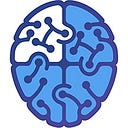Machine Learning Journey — Starting with Python, but not dwelling on it
Hello World,
Starting out in a new field is usually very intimidating. The amount of knowledge required to make progress can feel overwhelming. The increasing amount of information out there, doesn’t actually help with this. We’re often left with too much to learn, from too many sources…
It’s easy to get stuck in a never-ending search for the best resource, the shortcut to the next thing on the curriculum. Overcoming this information noise and making real progress is akin to a rocket defeating Earth’s gravity. It’s quite hard at the start, but with enough momentum, even the stars can be reached.
Machine Learning and Data Science are increasingly vast subjects, with countless courses, guides and projects freely available. Anyone starting out will learn from multiple sources, so there is no best, one-size-fits-all solution that magically has everything you need.
Starting out with Python
Python is the definite go to language when it comes to Machine Learning and Data Science, so it makes sense for anyone to start with it. There will be a temptation to attempt mastering it before proceeding to the next step, but it’s not really necessary for a Machine Learning or Data Science career. Its intricacies can be picked up along the way, as required by your projects.
The purpose of this article is to share some quality resources that provide a quick start with Python, so you can move on to more (perhaps more interesting) things…
Setting up
The 3 articles guide on how to set up the Python environment and install packages using Anaconda Navigator and PyCharm is a great way to start. No additional knowledge required, everything is described step by step.
A beginner-friendly way of setting up a Python environment
Python Environments Management in Anaconda Navigator
The Python Primer series
Cluj School of AI has a series of 6 articles that cover the most important Python concepts when getting started.
Map, reduce and lambda functions
Each article comes with a Jupyter notebook. All can be found on Github: https://github.com/clujsoai/python
Youtube video courses
This first course focuses more on working with data types and doesn’t mention objects.
https://www.youtube.com/watch?v=ahJB7ZA5E7g
The course below is a bit more comprehensive though too long for a single playthrough. It does introduce objects. The best thing is it has 3 projects at the end.
https://www.youtube.com/watch?v=_uQrJ0TkZlc
Youtube channels
All channels below are dedicated exclusively or partially to Python and all have video playlists for beginners. I recommend subscribing to these channels.
https://www.youtube.com/user/schafer5/playlists
https://www.youtube.com/user/consumerchampion/playlists
https://www.youtube.com/user/sentdex/playlists
Books
In addition to guiding you through Python, the following books each have an additional aspects to them.
Think Python goes through some broader computer science concepts.
http://greenteapress.com/thinkpython2/thinkpython2.pdf
Automate the boring stuff shows many practical uses for Python. Some of these techniques will be quite handy later, but feel free to skip the ones which are uncomfortable.
https://automatetheboringstuff.com/
Courses
For those seeking fully fledged courses, I recommend evaluating courses on Coursera or edx. Both offer courses for free, if you don’t look for a certificate that is. Truth be told, a certificate isn’t really necessary, much more important is the acquired knowledge. So you can access both courses below absolutely free.
Introduction to Computer Science (Python is used throughout)
Udemy is also a viable option, though courses there are not free. Some can be hundreds of dollars even, BUT there are very often sales that bring them down to a very affordable 9–10$.
Conclusion
It all comes down to your preferred learning style. Some people prefer videos, other books. Some thrive when studying alone, others need a community an online course provides. There really is no right and wrong.
What is important is not to obsess too much about what resource to use and just start. You find resources more suitable to your needs as you go along. The only secret is to keep at it and improve and never ever compare yourself to the “pros out there”. Really the only benchmark is yourself a week or a month ago.
It is time to start! I wish you the best of luck!
As always, your opinions, feedback or (constructive) criticism are welcomed in discussions below or at @mariussafta
Join our Facebook and Meetup groups and keep an eye out for discussions and future meetups.

